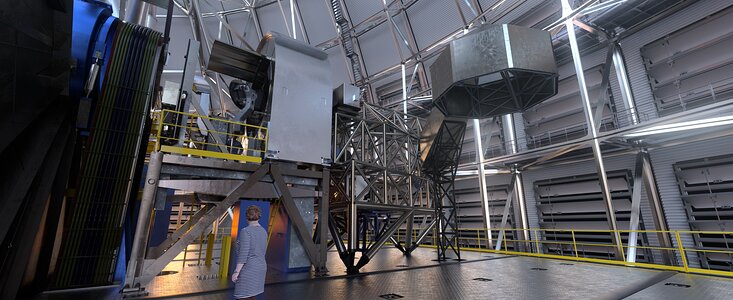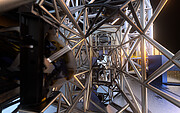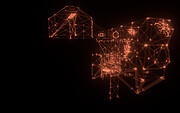Mitteilung
ELT-Instrument MORFEO besteht Preliminary Design Review
6. März 2023
MORFEO, ein zukünftiges Instrument am Extremely Large Telescope (ELT) der ESO, hat kürzlich sein Preliminary Design Review bestanden. Das adaptive Optiksystem von MORFEO verwendet spezielle Sensoren, um die Unschärfeeffekte der Erdatmosphäre zu messen und sie mit verformbaren Spiegeln zu korrigieren. Dies wird eine bisher noch nie erreichte Bildschärfe beim Blick ins Universum bieten und detaillierte Beobachtungen entfernter Galaxien und Sterne im Zentrum der Milchstraße ermöglichen.
Bodengebundene Teleskope wie das Extremely Large Telescope der ESO können ihr volles Potential nur mittels adaptiver Optik ausschöpfen, die die Turbulenzen der Erdatmosphäre ausgleicht, durch die die Sterne funkeln und die unseren Blick auf den Kosmos trüben. Neben ausgeklügelten Systemen, darunter ein großer verformbarer Spiegel, der die atmosphärischen Verzerrungen auf dem Weg des Lichts durch das ELT korrigiert, wird das Teleskop auch über MORFEO (Multiconjugate adaptive Optics Relay For ELT Observations; früher als MAORY bezeichnet) verfügen. Dieses Instrument, das nun seine Preliminary Design Review (PDR, etwa: vorläufige Designüberprüfung) bestanden hat, wird eine wichtige Korrekturschicht hinzufügen, die es dem ELT ermöglicht, Bilder zu erhalten, die so scharf sind wie die aus dem Weltraum.
MORFEO wird mit der ELT-Kamera, der Multi-AO Imaging CamerA for Deep Observations (MICADO), zusammenarbeiten, die sehr stabile und scharfe Bilder machen muss, um die Positionen, Helligkeiten und Bewegungen von Sternen präzise zu messen – eines ihrer wissenschaftlichen Ziele. Durch die Korrektur der atmosphärischen Störungen und weitere Korrekturen optischer Verzerrungen wird MORFEO MICADO in die Lage versetzen, perfekte Bilder über sein gesamtes großes Gesichtsfeld im nahen Infrarot aufzunehmen. Dies wird es dem ELT ermöglichen, entfernte Galaxien und Sterne im Zentrum der Milchstraße in noch nie dagewesener Detailschärfe zu beobachten.
Um dies zu erreichen, verwendet MORFEO verformbare Spiegel und andere hochmoderne Systeme, wie die Laserleitsterne des ELT, um Turbulenzen in den verschiedenen Schichten der Erdatmosphäre zu korrigieren. Diese Systeme erlauben MORFEO, eine 3D-Karte der atmosphärischen Turbulenzen zu erstellen, um sie dann in den von MICADO aufgenommenen Bildern zu korrigieren.
MORFEO wird eines von vier Instrumenten am ELT sein, wenn es nach Bauabschluss noch in diesem Jahrzehnt erstmals für astronomische Aufnahmen eingesetzt wird. Das ELT wird sich dann den größten astronomischen Herausforderungen unserer Zeit stellen, vom Aufspüren potentiell bewohnbarer erdähnlicher Exoplaneten bis hin zur Untersuchung der allerersten Sterne und Galaxien. Das Teleskop, insbesondere seine hochentwickelte adaptive Optik, baut auf der 60-jährigen Erfolgsgeschichte der ESO im Bereich der internationalen Zusammenarbeit in der Astronomie und der gemeinsamen Nutzung von Ressourcen und Fachwissen auf und setzt diese fort.
Weitere Informationen
Das MORFEO-Projekt wird zusammen mit der ESO von einem internationalen Konsortium geleitet, das sich aus drei Forschungsinstituten zusammensetzt: dem Istituto Nazionale di Astrofisica (INAF) in Italien, dem Institut de Planétologie et d'Astrophysique de Grenoble (IPAG) in Frankreich und der Universität Galway in Irland.
Kontaktinformationen
Patrick Caillier
MORFEO Project Manager at ESO
Garching bei München
E-Mail: Patrick.Caillier@eso.org
Elena Valenti
MORFEO Project Scientist at ESO
Garching bei München
E-Mail: Elena.Valenti@eso.org
Paolo Ciliegi
MORFEO Principal Investigator
INAF Osservatorio Astronomico di Bologna, Italien
E-Mail: paolo.ciliegi@inaf.it
Juan Carlos Muñoz Mateos
ESO Media Officer
Garching bei München
Tel: +49 89 3200 6176
E-Mail: press@eso.org
Über die Mitteilung
| ID: | ann23002 |
Our use of Cookies
We use cookies that are essential for accessing our websites and using our services. We also use cookies to analyse, measure and improve our websites’ performance, to enable content sharing via social media and to display media content hosted on third-party platforms.
ESO Cookies Policy
The European Organisation for Astronomical Research in the Southern Hemisphere (ESO) is the pre-eminent intergovernmental science and technology organisation in astronomy. It carries out an ambitious programme focused on the design, construction and operation of powerful ground-based observing facilities for astronomy.
This Cookies Policy is intended to provide clarity by outlining the cookies used on the ESO public websites, their functions, the options you have for controlling them, and the ways you can contact us for additional details.
What are cookies?
Cookies are small pieces of data stored on your device by websites you visit. They serve various purposes, such as remembering login credentials and preferences and enhance your browsing experience.
Categories of cookies we use
Essential cookies (always active): These cookies are strictly necessary for the proper functioning of our website. Without these cookies, the website cannot operate correctly, and certain services, such as logging in or accessing secure areas, may not be available; because they are essential for the website’s operation, they cannot be disabled.
Functional Cookies: These cookies enhance your browsing experience by enabling additional features and personalization, such as remembering your preferences and settings. While not strictly necessary for the website to function, they improve usability and convenience; these cookies are only placed if you provide your consent.
Analytics cookies: These cookies collect information about how visitors interact with our website, such as which pages are visited most often and how users navigate the site. This data helps us improve website performance, optimize content, and enhance the user experience; these cookies are only placed if you provide your consent. We use the following analytics cookies.
Matomo Cookies:
This website uses Matomo (formerly Piwik), an open source software which enables the statistical analysis of website visits. Matomo uses cookies (text files) which are saved on your computer and which allow us to analyze how you use our website. The website user information generated by the cookies will only be saved on the servers of our IT Department. We use this information to analyze www.eso.org visits and to prepare reports on website activities. These data will not be disclosed to third parties.
On behalf of ESO, Matomo will use this information for the purpose of evaluating your use of the website, compiling reports on website activity and providing other services relating to website activity and internet usage.
Matomo cookies settings:
Additional Third-party cookies on ESO websites: some of our pages display content from external providers, e.g. YouTube.
Such third-party services are outside of ESO control and may, at any time, change their terms of service, use of cookies, etc.
YouTube: Some videos on the ESO website are embedded from ESO’s official YouTube channel. We have enabled YouTube’s privacy-enhanced mode, meaning that no cookies are set unless the user actively clicks on the video to play it. Additionally, in this mode, YouTube does not store any personally identifiable cookie data for embedded video playbacks. For more details, please refer to YouTube’s embedding videos information page.
Cookies can also be classified based on the following elements.
Regarding the domain, there are:
- First-party cookies, set by the website you are currently visiting. They are stored by the same domain that you are browsing and are used to enhance your experience on that site;
- Third-party cookies, set by a domain other than the one you are currently visiting.
As for their duration, cookies can be:
- Browser-session cookies, which are deleted when the user closes the browser;
- Stored cookies, which stay on the user's device for a predetermined period of time.
How to manage cookies
Cookie settings: You can modify your cookie choices for the ESO webpages at any time by clicking on the link Cookie settings at the bottom of any page.
In your browser: If you wish to delete cookies or instruct your browser to delete or block cookies by default, please visit the help pages of your browser:
Please be aware that if you delete or decline cookies, certain functionalities of our website may be not be available and your browsing experience may be affected.
You can set most browsers to prevent any cookies being placed on your device, but you may then have to manually adjust some preferences every time you visit a site/page. And some services and functionalities may not work properly at all (e.g. profile logging-in, shop check out).
Updates to the ESO Cookies Policy
The ESO Cookies Policy may be subject to future updates, which will be made available on this page.
Additional information
For any queries related to cookies, please contact: pdprATesoDOTorg.
As ESO public webpages are managed by our Department of Communication, your questions will be dealt with the support of the said Department.



